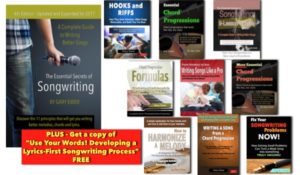In today’s social media world, we can get fooled into thinking that because something sounds smart, clever or pithy — or even just rhymes — that it must be true.
“You never learn anything by doing it right.” (Yes, you do.) “Rules are meant to be broken.” (No, they aren’t.)
Clever online statements of course require the same kind of scrutiny that any statement anywhere requires. But once in a while I see one that really hits home. Today, on comedian Ruth Buzzi’s Twitter feed (@Ruth_A_Buzzi), I read this:
The fact that no one understands you does not make you an artist.
Yes, I can get wholeheartedly behind that. It’s not an original thought, as I’ve seen this written before, and you can find it on coffee mugs and t-shirts. But it’s one of the few clever statements that I believe songwriters, and lyricists in particular, would be well advised to read daily.
 Thousands of songwriters are using The Essential Secrets of Songwriting eBooks to straighten out their songwriting problems. Have you been spending years just reinforcing errors? Sort out your technique! Get today’s deal!
Thousands of songwriters are using The Essential Secrets of Songwriting eBooks to straighten out their songwriting problems. Have you been spending years just reinforcing errors? Sort out your technique! Get today’s deal!
I find myself wondering if more than a few songwriters and lyricists believe that writing something unintelligible puts 100% of the onus on the consumer of the music to understand it.
Sometimes songwriters will combine words in a certain way because they like the sound of those words together, or perhaps they enjoy the imagery they concoct. And though the words and phrases ultimately don’t really make a lot of sense, they fault the listener for not grasping the profundity of it all.
John Lennon was pretty open about the songs for which he enjoyed the images created by the lyric, but when it came right down to it, it was more or less gibberish (“Come Together”). I think that’s fair enough. If you like the sounds of words, and that was your main motivation for creating the lyric, being up front about it means your audience doesn’t waste a lot of time trying to find meaning that isn’t there.
Good lyricists who dabble in the abstract have a way of finessing the meaning of their lyric so that, after some thought and study, the listener can pull much of the intended meaning out. And it’s fun when we can understand enough (but not necessarily all) of what the writer intended.
So for me, a good lyric by an excellent lyricist has several layers:
1. A Layer of Immediate Understanding: There’s something there that, even if I understand nothing else, I get at least some picture of what is being sung about. Example:
Before electric light
You paddled through the soup of darkness as a crocodile
Cherry picking in the river
I would leave crisp note footprints at the Bankside
(“Tidal” – Imogen Heap. Read the full lyric)
2. A Deeper Layer of Relationships Between Words and Images: As I look at the entire lyric, I start to see relationships between various images that are being described. It doesn’t mean that I’ll understand it all, certainly not on its first listen. But I have enough that I can at least find a direction to start looking. In “Tidal”, you’ll find “river”, “Bankside”, “full moon”, “tidal”… what does it all mean? You may not be sure yet, but the words, and their connection to each other, give us confidence that meaning exists.
3. An Even Deeper Layer For Which I May Never Find Answers. I remember a songwriter once saying that a bit of advice she had received once was to “save a bit for herself”, and not feel that every song she writes has to expose every part of her deepest thoughts. I think that’s good advice. There are some lyrics for which the true meaning may be hidden too deeply. But as long as there is enough there for us to understand at least something, that may be enough.
And I would also say this: Your ability to hide a lyric’s meaning is not evidence of its greatness. Some of the best lyrics lay everything bare in plain site. I’ve always loved the classic lyric for “Fly Me To the Moon.”(Full lyric) It uses imagery and metaphors that are very easy to understand. And it’s one of the best lyrics of the 20th century.

 “Hooks and Riffs: How They Grab Attention, Make Songs Memorable, and Build Your Fan Base” shows you how a good hook can make the difference between songwriting success and failure. With great examples from pop music history.
“Hooks and Riffs: How They Grab Attention, Make Songs Memorable, and Build Your Fan Base” shows you how a good hook can make the difference between songwriting success and failure. With great examples from pop music history.










